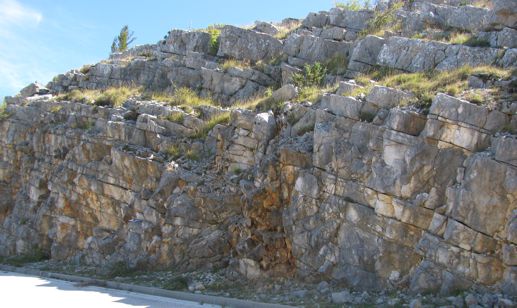Division of Geology and Paleontology, Horvatovac 102a
Division of Mineralogy and Petrology, Horvatovac 95
Employees/Staff and students:
23 teaching scientists
5 teaching assistants – junior researchers
13 technical/administration staff
300 students

GEOLOGY TODAY
The Earth is a dynamic system, subject to constant change, which requires continuous research and new interpretations. This makes geology one of the most dynamic disciplines. The geological investigations are thus very diverse and often complementary to other natural sciences. Geology studies the structure of minerals, origin of rocks, migration of elements, origin of mineral deposits, the structure, systematics and lifestyle of the former animals and plants, evolution of life on Earth, the processes in the present and former seas, lakes, deserts and glaciers, on the shores and mountains, as well as changes and disappearance of different landscapes. It also explores the underground and surface waters, changes in the Earth's surface, the functioning of modern environments and the human impact on them, together with issues of sustainable development and environmental management, motion of the Earth's crust and its breaking or bending, movement of magma and its cooling, melting and transformation of rocks deep in the crust, the work of the volcano and many other phenomena and processes.
SCIENTIFIC WORK
The Department of Geology nourishes scientific research in all fields of geology and mineralogy - in sedimentology and stratigraphy, sedimentary basins, environmental geology, geology and protection of carst areas, subsurface geology, evolution, paleontology and biostratigraphy, in geochemistry, mineralogy with crystallography, petrology of igneous and metamorphic rocks, petrology of sedimentary rocks, marine geology, recent sedimentation, etc.
B.Sc. final work/Graduate work at the Department of Geology is specific in that they usually includes independent field study, after which the samples collected are being analyzed in laboratories using various methods and techniques, ranging from microscopic studies to the X-ray and chemical analyses. Areas of research are very diverse and include almost the entire Croatian territory, and even wider areas. This work requires psychophysical readiness of students and independence in their work, along with the well-developed sense of space.
ACADEMIC DEGREES (after Bologna process)
1. Bachelor of Science in Geology
2. Bachelor of Environmental Science
3. Master of Science in Geology
4. Master of Environmental Science
POSTGRADUATE STUDY
Graduate students that show particular interest in the profession and achieve good results in undergraduate studies, are encouraged to continue their studies and acquire specific knowledge through the postgraduate study program. PhD studies at the Department nourish scientific development in all fields of geology. The study includes mastering theoretical concepts, methods and research techniques, and the adoption of prior knowledge relevant to research and understand the problems of certain topics. PhD students select courses of their interest from a list of 40 items. The most important part of the study is a scientific research work on the student's main research theme under the supervision of experienced scientists and teachers, ending with the production of the thesis or doctoral dissertation.
EMPLOYMENT
Geologists are today being employed in geological research and educational institutions (institutes, universities, museums), consulting companies, environmental services and planning, research organizations, exploitation and processing of natural resources, construction companies (primarily those engaged in building roads, dams, energy facilities, regular landfills and those for hazardous substances), the cement industry, glass, ceramics, abrasives, fertilizers. It is expected that geologists will be also employed by counties and municipalities for the professional part of the opening of the quarries, brick plants, hydrotechnical construction, environmental planning, and environmental protection. Students who opt for the teaching profile of geology and geography teachers will find a place in schools, but also in other activities such as nature conservation and environmental planning, management of national parks and nature parks, and also tourism.